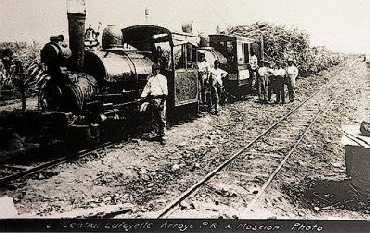When we think of robber barons, the usual suspects include John D. Rockefeller, J.P. Morgan and Cornelius Vanderbilt.
But one robber baron has gone underappreciated: the man who stole Puerto Rico.
His name is Charles Herbert Allen, the first U.S. civilian governor of Puerto Rico. He served only 17 months, but that was all he needed to perform one of the most spectacular crimes of the 20th century.
By the time Allen left Puerto Rico, the entire island was a crime scene.
Allen hailed from Lowell, Massachusetts—famous for child labor and textile mill sweatshops. Though he never served in the armed services, he loved to dress in military regalia and have people address him as “colonel.”

(Allen in Lowell, MA)
He arrived in Puerto Rico on April 27, 1900 like a Roman conqueror with a naval cannon salute, the 11th U.S. Infantry Band and a division of armed soldiers behind him.
He marched through San Juan and into the Governor’s mansion.
The mansion was gift-wrapped. Allen delivered his inaugural address behind the largest, most imperial flags that Puerto Ricans had ever seen.

(Via the author)
It rained heavily that day—as if God were shedding tears over the island itself.
Allen had been a congressman, a Navy bureaucrat and commissioner of prisons for Massachusetts. But in Puerto Rico, he finally became a businessman.
He raided the island treasury by raising taxes, withholding municipal and agricultural loans, and freezing all building repair and school construction funds.
He subsidized US-owned farm syndicates and issued no-bid contracts to US businessmen, for roads built at twice the old cost.
He created new offices and salary lines—all staffed by U.S. bureaucrats. By the time he left in September 1901, nealy all the 11 members of the governor’s Executive Council were U.S. expatriates, and half the appointed offices in the government of Puerto Rico had gone to visiting Americans—626 of them at top salaries.
But Allen’s real interest in Puerto Rico became apparent in his
“First Report of the Governor of Porto Rico.” Here are some of his entries:
The yield of sugar per acre is greater than in any other country in the world. (p. 99)
A large acreage of lands, which are now devoted to pasturage, could be devoted to the culture of sugar cane. (p. 39)
Molasses and rum, the incidental products of sugar cane, are themselves sufficient to pay all expenses of the sugar planters and leave the returns from his sugar as pure gain. (p. 39)
The cost of sugar production is $10 per ton cheaper than in Java, $11 cheaper than in Hawaii, $12 cheaper than in Cuba, $17 cheaper than in Egypt, $19 cheaper than in the British West Indies, and $47 cheaper than in Louisiana and Texas. (p. 40)
This was no mere “First Annual Report” to the president of the United States. It was a business plan for a sugar empire, and Allen quickly staked his claim. A few weeks after handing in this report, on September 15, 1901, Allen resigned as governor and headed straight to Wall Street, where he joined the House of Morgan as vice president of both the Morgan Trust Company and the Guaranty Trust Company of New York.
Allen built the largest sugar syndicate in the world, and his hundreds of political appointees in Puerto Rico provided him with land grants, tax subsidies, water rights, railroad easements, foreclosure sales and favorable tariffs.

(Sugar cane train in Arroyo, Puerto Rico)
By 1907 Allen’s syndicate, the American Sugar Refining Company, owned or controlled 98% of the sugar processing capacity in the United States and was known as the Sugar Trust. By 1910 Allen was Treasurer of the American Sugar Refining Company, by 1913 he was its President and by 1915 he sat on its Board of Directors.
By 1930, Allen and U.S. banking interests had converted 45 percent of all arable land in Puerto Rico into sugar plantations. These bank syndicates also owned the insular postal system, the entire coastal railroad and the international seaport of San Juan.

(Sugar cane being loaded onto a train for transportation to the refinery. Near Ponce, Puerto Rico. LIBRARY OF CONGRESS)
By 1934, 80 percent of all the sugar cane farms in Puerto Rico (and their underlying land) were owned by a U.S. banking syndicate. Allen, and the American Sugar Refining Company, set the template for all of them.
Today the American Sugar Refining Company is known as Domino Sugar.
As the first civilian governor of Puerto Rico, Allen used his governorship to acquire an international sugar empire, and a controlling interest over the entire Puerto Rican economy.
Charles Herbert Allen. The first civilian governor. The man who stole Puerto Rico.
Nelson A. Denis is a former New York State Assemblyman and author of the upcoming book, War Against All Puerto Ricans.
The Man Who Stole Puerto Rico




